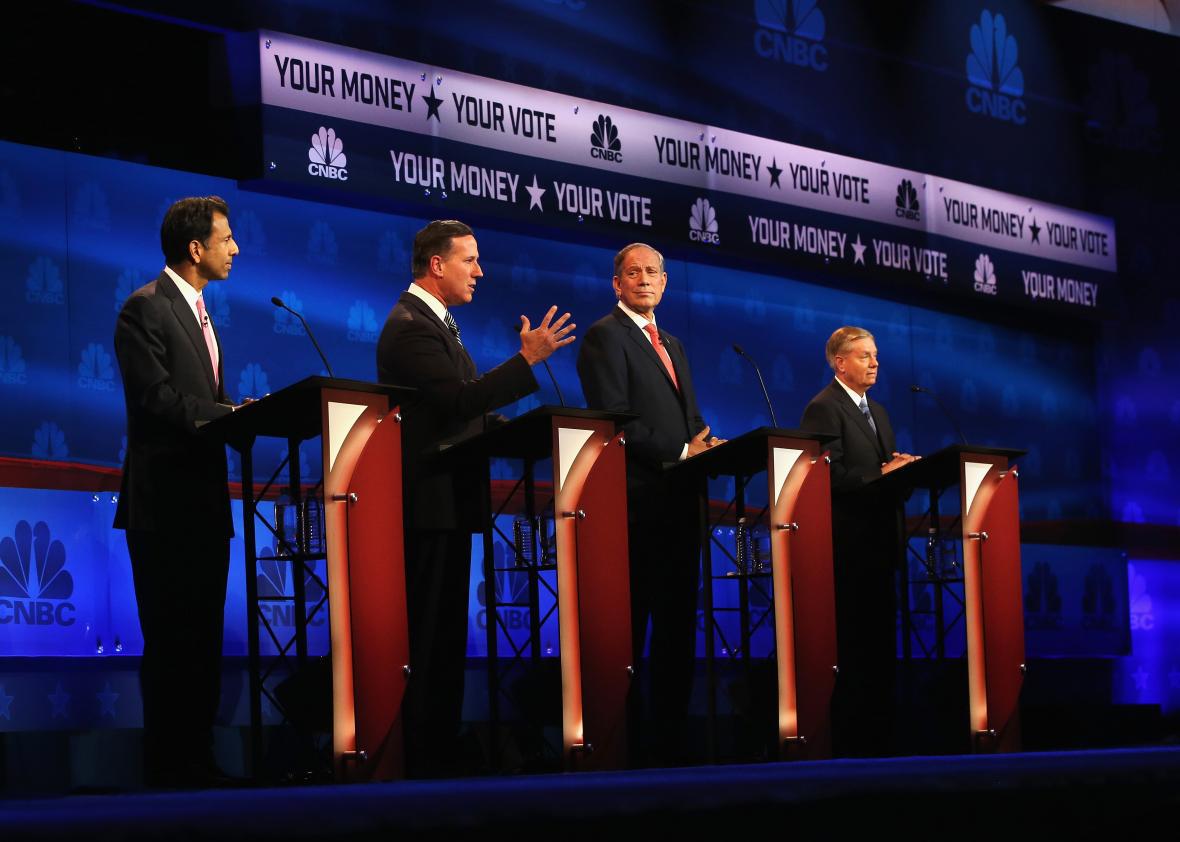Lindsey Graham, Bobby Jindal, George Pataki, and Rick Santorum took the stage in Boulder, Colorado, in the early undercard debate on Wednesday. All four GOP hopefuls—already flailing in the polls—looked hopeless.
It was the third time those four candidates were stuck in non-prime-time purgatory, and none of them did anything to convince voters to give them a second look. Graham, the only one of the GOP understudies who ever seems to be in on the joke, had the University of Colorado crowd laughing early when he said that he didn’t have the grades to be accepted at the school. “Looking at their academic standards, the only way I could have gotten into the university is to be invited to this debate tonight,” Graham said, devoting precious seconds of his opening statement to again joke with voters that he’s not that smart.
Later in the night, he played the role of class clown again while trying to convince Republican voters that the country needs to act on climate change. “I’m not a scientist—and I’ve got the grades to prove it,” he said. “But I’ve talked to the climatologists and they tell me that the greenhouse gas effect is real, that we’re heating up the planet. I just want a solution that would be good for the economy that doesn’t destroy it.” That was a reasonable and welcome point; it’s unlikely to look so reasonable in a race where even acknowledging man-made climate change is anathema to the party’s base.
Bobby Jindal, meanwhile, had one of the most awkward exchanges of the night with CNBC moderator John Harwood when he seemed to acknowledge that his Louisiana budgets were “nonsense on a stick”:
Harwood: “When you came into office with a budget surplus in the state of Louisiana, now years later the state legislature faced a $1.6 billion budget gap and the Republican state treasurer called one of your approaches to that problem, ‘nonsense on a stick.’ … Are you going to do for the federal budget what you did for the Louisiana budget?
Jindal: “Absolutely, John. What we did is cut state spending.”
George Pataki played the role that Jim Webb had played in the Democratic debate earlier this month, basically begging to get a word in. Meanwhile, if Rick Santorum, a man who made Mitt Romney work for the GOP nomination in 2008, said something new on Wednesday night, I didn’t hear it.
Of course, even if one of the four men would have shaken things up on stage, it’s unlikely it could have saved their campaigns. Past successful debate performances, after all, have not always predicted future polling returns.
Carly Fiorina dominated the first undercard debate in August, a showing that helped push her into the GOP’s second tier and secure her a spot on the main stage at the following debate. With the novelty of the format gone, though, the second debate failed to offer a second golden ticket. Graham was generally considered to have been the strongest performer in the second undercard—though not nearly as strong as Fiorina had been in the first—but never saw the same post-debate bump. The senator from South Carolina had reached 1 percent in two of the 10 major polls that preceded that debate; he managed to hit that mark in three of the 10 that followed. Graham-mentum his undercard win was not.
Still, Wednesday’s junior varsity scrimmage wasn’t entirely without drama. It was likely the last chance that its participants had to make anything resembling a splash before Fox Business Channel sends out invites next week to the fourth GOP debate, which will be held in Wisconsin on Nov. 10. Chances are that the Milwaukee main stage and undercard will—yet again—look largely the same, but thanks to the cable network’s typically Foxian selection criteria, things aren’t totally hopeless for those who have been stuck in non-prime-time purgatory. Maybe Graham or Jindal can benefit from those criteria—though even if they do, there’s a long distance between snagging a spot on a debate stage and winning your party’s nomination.
FBC is selecting the participants based on the four most recent major national polls as of next Wednesday. Given how tightly bunched the bottom third of the GOP field remains, using so few polls isn’t all that different from drawing straws for the final spots on the main stage. In the latest RealClearPolitics rolling average, ninth place John Kasich is only about a half a percentage point ahead of 11th place Lindsey Graham, while 10th place Chris Christie is only slightly more than two points ahead of 14th place George Pataki. Given Fox’s intentionally narrow polling sample, an unusually strong performance in a single poll by someone like Jindal or Graham—or a particularly lackluster showing in one by Christie or Kasich—could prove the decisive difference.
Still, assuming none of the current Top 10 joins Scott Walker in the halls of candidates past in the next two weeks, the odds appear to be stacked against the also-rans. During the first two debate nights, they preformed for a television audience of about 6 million—while their better-polling rivals did so in front of an audience roughly four times that size. The post-debate coverage only exacerbates the differences between the two events.
It’s no surprise, then, that at this stage of the race we’re not seeing a lot of movement at the bottom of the field. By now, Graham and his fellow Republican understudies have auditioned three times for the main debate. None of them convinced enough Americans in the first two that they deserved a chance on the main stage and in the larger campaign conversation. There’s no reason to think they managed to do so on Wednesday.
